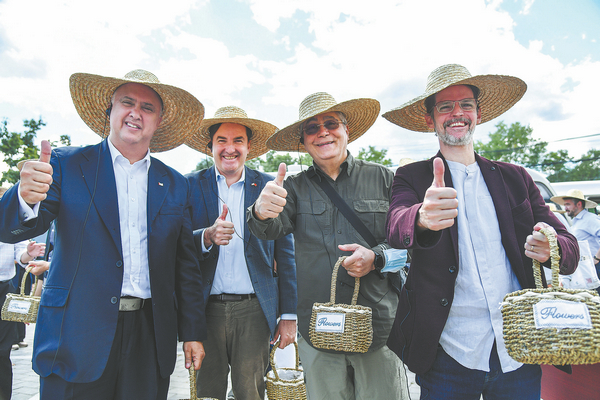

Sabino Vaca Narvaja, Argentina's former ambassador to China, is now playing different roles in his country's parliament and academic circle. His career has been closely connected with China, a country across the Pacific Ocean, with his family being partly responsible for his lasting interest in the country.
"I enhanced my knowledge (about China)… focusing mainly on aspects related to the pace of its development and its technological advancement," Vaca Narvaja said, emphasizing that his four years in China "was a great experience", as "they were years of intense and highly motivating work".
During his tenure in China, he visited almost every Chinese province, because he believes that the richness of China, in addition to its thousands of years of history, "lies in the diversity and complexity of its different provinces and regions".
"The size of the provinces is a very interesting element for Latin America since some of them have double or triple the population of countries in our (Latin American) region, and the same is true for their GDP, which increases the need to expand our exchanges with (China) … in the commercial, scientific, tourism, cultural and sports fields," he said.
His Chinese name, "Niu Wangdao" intrigued almost every Chinese person he met. Vaca means "cow" in Spanish, and its Chinese equivalent is niu. The cow, for the Chinese people, "is an important animal since it represents constancy and permanence of efforts", he said.
His given name in Mandarin, "Wangdao" sounds special to the Chinese people, as it pays tribute to Chinese translation master Chen Wangdao.
Chen (1891-1977) was an influential figure in the early years of the Communist Party of China, not least because he was the first to translate The Communist Manifesto into Mandarin.
Vaca Narvaja narrated a famous anecdote in which Chen confuses ink with tea due to his intense focus on his work.
"That shows the level of his concentration and the love he had for his work," he said.
In Mandarin, wangdao literally means "being attentive to the path".By adopting that name, "I wanted to show my respect (to Chen) and (indicate) the aspect I wanted to work on (to boost) bilateral ties," he said.
His new book, On the Way: Chronicles in China, published earlier this year, analyzes the latest changes in the international landscape on which China is one of the main players and Latin America its natural strategic partner.
Passion continues
After returning to Argentina, Vaca Narvaja resumed his political work in Parliament, while pursuing his academic goal with greater passion and intensity at the National University of Lanus, where he is the director of the Sino-Argentine Cooperation Program, and the National University of Jose C. Paz, which invited him to oversee the "first master's degree program in Chinese Studies", with the focus on China's relations with Latin America.
"This year I am introducing a foundation study that will focus on geopolitical analysis and seek ways to accelerate our national development with an eye on international relations and focus on Asia, particularly on China," he said. For Vaca Narvaja, it is essential to further deepen academic cooperation between the universities and leading intellectual groups of the two countries, so as to "promote the debate on ideas that allow us to generate joint programs to overcome the challenges of the future".
As a keen observer of China including its economy, Vaca Narvaja has written many articles on hotspot issues such as Chinese-made new energy vehicles. "China is experiencing a problem that has long been a problem for the developed countries in general; (perhaps) it is facing a crisis of aging," he said.
The Chinese authorities have implemented long-term policies to address the problem, he said, adding that the country now aims to become self-sufficient in high-tech, and stabilize its supply chain. In fact, China has been making painstaking efforts to reshape and diversify its global economic ties and increase the number of foreign suppliers to stabilize the supply of raw materials.
"China decided to move toward innovation- and high-tech-driven economic development model, a model that can ensure more balanced and sustainable economic growth, and accords great importance to boosting the country's high added value sector," he said.
Citing the measures taken to boost domestic demand during the last Spring Festival Golden Week holiday, when a record 9 billion passenger trips were made, he said: "I can say the Chinese economy has promising prospects in the short, medium and long terms."
When asked about his China-related programs in universities, he said "learning is something permanent".
"I am a very curious person, and my experience in China and the possibility of putting my ideas into practice significantly enhanced my knowledge." Vaca Narvaja now enjoys spending time in the classroom in the company of students "because teaching is a dialectic process that receives feedback through dynamic and collective interaction".
"A return to the university environment is always enriching. The university is a place that encourages debates on ideas and analyses of extremely complex times. That is why I believe knowledge is key to strengthening mutual understanding, especially because there is still a lot of ignorance about what China really is.
"Interest in China is growing in the academic field, and more and more students are learning the Chinese language and studying Chinese customs and history," he said, stressing that it is essential to implement policies with a long-term vision, because that is the only way to achieve sustainable development and take advantage of the complementarity of the Argentine and Chinese economies.